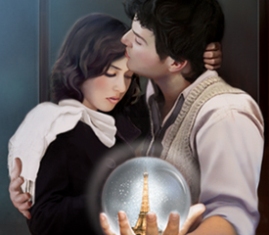
Baby, It's Cold Outside
There was a bit of Frank Loesser in Cincinnati Opera's "La Boheme" Wednesday night at Music Hall -- in the supertitles when Rodolfo tries to persuade
Mimi not to leave his apartment because, "baby, it's cold outside."

Charlie Chaplin made an appearance, too, in the person of the toy vendor Parpignol outside the Cafe Momus in act II.
The supertitles were by Celeste Montemarano of New York City Opera. The appearance of the Little Tramp helped update the opera from late 19th-century Paris to Paris during the early 1930s.
The co-production, by Cincinnati Opera and English National Opera, was directed by Jonathan Miller and designed by Isabella Bywater. It is a handsome one, with a unitary, "reversible" set that was the young men's garret in the first and fourth acts and and the streets of the Latin Quarter in the second and third. Except for the costumes -- knee length skirts and heels for the women instead of long dresses -- and the ubiquitous cigarette for men and women alike, giving the production a 1930s cinematic look, there was nothing to come between the listener and Puccini's ravishing music.
The music was well attended to by an outstanding cast of young singing actors, headed by tenor Sephen Costello and soprano Ailyn Perez as Rodolfo and Mimi, whose dreams of love are disappointed by the realities of life. Married in real life, the two singers made an attractive and emotionally appealing couple, with fresh young voices that soared through the hall individually and together, often over the Cincinnati Symphony Orchestra in full cry.
Roldolfo's fellow "bohemians," starving artists content to live for the muses and for love, were energetically sung by baritones Marco Caria and Christopher Schaldenbrand as Marcello and Schaunard (painter and musician, respectively) and bass Dennis Sedov as the philosopher Colline. Marcello's flame Musetta was soprano Georgia Jarman, a brash, hip-swinging sexpot in act II and Mimi's deeply compassionate friend, who pawns her diamond earrings to buy medicine and a doctor for Mimi at the end.
Cincinnati native Thomas Hammons was perfect as the landlord Benoit, who is teased for his virility by the young men in order to distract him from collecting their overdue rent. Tenor Anthony Beck sang the toy vendor Parpignol with flair, breaking out for a twirl of the cane or two as Chaplin and captivating the street urchins with his wares.
Conductor John Keenan, pressed into service in June to lead Wagner's "Die Meistersinger," kept the momentum going, drawing a rich and highly colorful performance from the CSO musicians.
The chemistry between Costello and Perez was potent, from their first meeting to ignite Mimi's quenched candle to their heart-breaking farewell as she succumbed to tuberculosis. They made it obvious that Mimi and Rodolfo already had their eyes on each another, as he swooped her into his apartment and she conveniently "lost" her key to prolong their initial encounter. As they sang of parting, but "not until springtime," Marcello and Musetta quarreled visibly behind a second-story window. The effect was ineffably tender.
The hi-jinks of the young men gave the opera much of its appeal. Whether it was Rodolfo tearing up his play and burning it to provide heat for their apartment in act I, or the friends dancing and dueling with baguettes of bread in the last act, they kept the audience in stitches. By contrast, Sedov's farewell to his overcoat was delivered with suitable solemnity.
Miller's stage direction was lively, detailed and invariably engaging to the eye, from the Chorus milling happily outside the Cafe Momus on Christmas Eve, to Colline indifferently wiping his mouth on the bedspread in act IV. Jarman, as the feisty, flirty Musetta, flaunted her charms brazenly at the Cafe Momus as Marcello sat idly by scanning a newspaper, and bass Nathan Stark as Musetta's escort Alcindoro made a commotion with his hapless fretting. Giving the scene an added comic twist, a woman in a flowered hat and sensible shoes sat disconsolately to the side, nursing a drink.
The production repeats at 7:30 p.m. Friday, 3 p.m. Sunday at Music Hall. Tickets are $27-$157 at (513) 241-2742 or online at www.cincinnatiopera.org
Before the curtain rose on the first act, Cincinnati Opera board of trustees president Cathy Crain announced that the company will balance its budget this season for the 21st year in a row and that artistic director Evans Mirageas and general director Patty Beggs had renewed their contracts through the 2015 Opera season.
Mirageas then announced the lineup for Cincinnati Opera's 2011 summer festival and that it will take place at Music Hall, since the planned renovation of the hall has been pushed back to 2012.
The 2011 season will return to a four-opera format (there were three operas this season plus a 90th anniversary gala concert). It will have considerable variety opening with Verdi's "Rigoletto" with soprano Sarah Coburn as Gilda. Next will come John Adams' "A Flowering Tree," an East Indian folk tale introduced at the Vivian Beaumont Theater in New York's Lincoln Center in August, 2009. Tchaikovsky's "Eugene Onegin" will return after an absence of 27 years with baritone Nathan Gunn as Onegin. The season will close with Mozart's "The Magic Flute" conducted by Edoardo Mueller with soprano Nicole Cabell as Pamina. For further information, visit www.cincinnatiopera.org